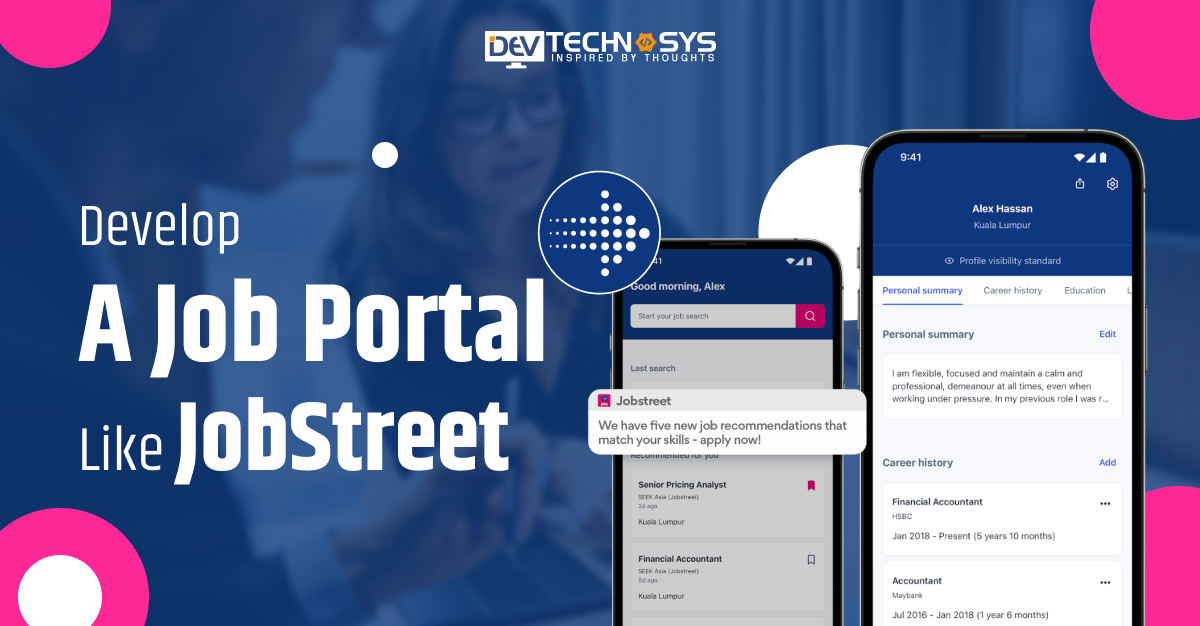“One portal, Endless possibilities.”
Nowadays, the competition has increased so much that it has become very difficult to get a job, and it is tough to find an offline job. Still, if we talk about online job portals like Jobstreet, then it has made everything easy; on it, the user can find a job as per their choice by uploading a resume, and companies can also hire a good employee by putting the job requirements.
As per the global market, the Job boards market was valued at around $13.20 billion in 2024, and it is expected to increase to around $37.76 billion by the end of 2032.
This data shows that investing in the job portal development is one of the most lucrative opportunities and generates new revenue streams.
In this blog, we will explore how to develop a job portal like Jobstreet and why businesses are ready to invest in it.
Let’s start!
What is JobStreet?
JobStreet is a prominent online employment network that links job seekers and businesses around Asia, mainly in Malaysia, the Philippines, Indonesia, and Singapore. Founded in 1997, it provides job listings, resume services, and recruiting tools to assist individuals in finding suitable jobs and businesses in hiring competent personnel.
Job portal apps like Indeed or JobStreet are part of SEEK Asia, a division of the SEEK Group, a global leader in online job boards.
- Job Search Engine
- Resume Builder
- Job Alerts
- Career Resources
Market Analysis of Global Job Portals
- By the end of 2032, the Job boards market is projected to have grown from its 2024 valuation of around $13.20 billion to approximately $37.76
- The market is expected to increase steadily over the projected period (2025-2032) at a CAGR of 9%.
- Over the course of the projection period, AI-based video interviews are anticipated to be the market’s largest category.
- Among the leading companies in the worldwide market are BambooHR LLC, HireVue, Inc., TalentLyft, Recruitee.com, SmartRecruiters, TestGorilla, Fountain, and Yello.
- According to a study, the North America holds the largest share of career portal in 2024 and it is projected to increase during the forecast period.
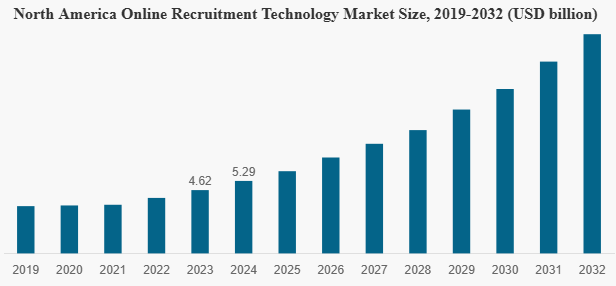
10 Popular Job Portals Like Jobstreet
The following table lists 10 best job portals that are comparable to JobStreet, together with information about their debut year, platform accessibility, and user reviews or download counts:
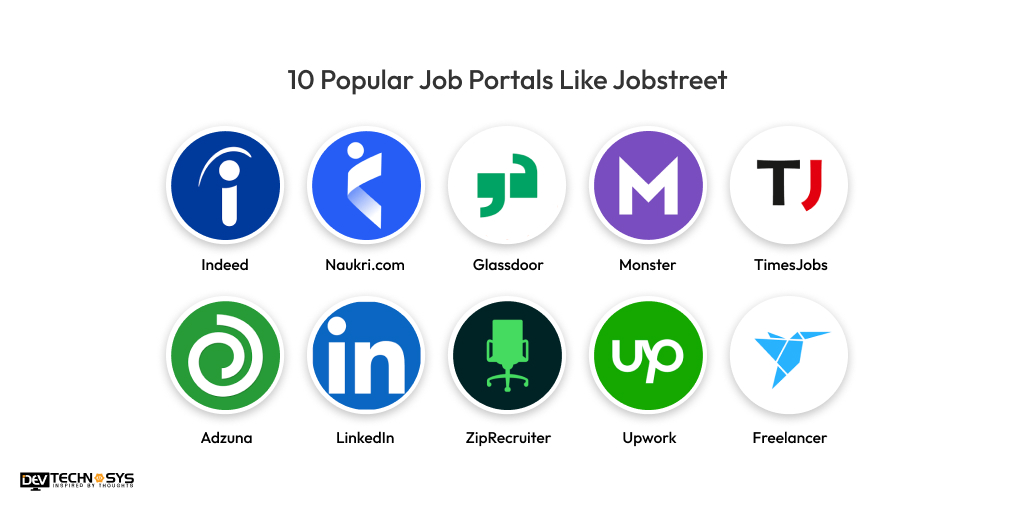
| App Name | Downloads | Stores Ratings | Launch Year | Platform Availability |
| Indeed | 100M+ | 4.5 | 2004 | Android, iOS, Web |
| Naukri.com | 50M+ | 4.3 | 1997 | Android, iOS, Web |
| Glassdoor | 10M+ | 4.3 | 2008 | Android, iOS, Web |
| Monster | 10M+ | 4.2 | 1999 | Android, iOS, Web |
| TimesJobs | 5M+ | 4.2 | 2004 | Android, iOS, Web |
| Adzuna | 1M+ | 4.4 | 2011 | Android, iOS, Web |
| 1B+ | 4.5 | 2003 | Android, iOS, Web | |
| ZipRecruiter | 10M+ | 4.6 | 2010 | Android, iOS, Web |
| Upwork | 50M+ | 4.6 | 2015 | Android, iOS, Web |
| Freelancer | 10M+
|
4.4 | 2009 | Android, iOS, Web |
Major Benefits of Job Portals Like Jobstreet
Job portals like JobStreet offer streamlined access to thousands of job listings, real-time application tracking, personalized alerts, and employer reviews—empowering job seekers with tools to find suitable roles faster while helping companies efficiently recruit top talent. So, here we provide online job portal working and benefits:
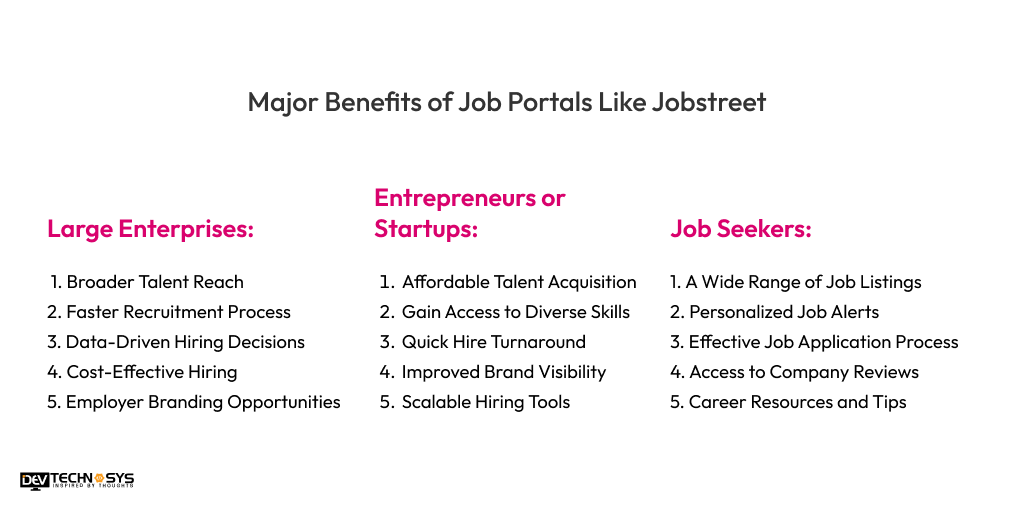
Benefits for Large Enterprises:
1. Broader Talent Reach
A similar job portal like Jobstreet enables major businesses to access a wide pool of applicants from many areas and sectors, boosting the likelihood of finding the ideal fit quickly and effectively through targeted postings and extensive filtering tools.
2. Faster Recruitment Process
Enterprises may use automated application tracking, resume screening, and job matching systems to drastically cut hiring time, improve workflows, and rapidly find quality applicants without having to manually examine thousands of applications.
3. Data-Driven Hiring Decisions
If you build a recruitment app like JobStreet, it gives information on candidate behavior, job ad performance, and market trends, allowing businesses to make more educated, data-driven recruiting decisions.
4. Cost-Effective Hiring
Posting jobs on sites like JobStreet is frequently less expensive than traditional hiring techniques. It also lowers the cost of hiring by increasing recruiter productivity and removing the need for many third-party recruiting firms.
5. Employer Branding Opportunities
Enterprises may use personalized corporate pages to display their company culture, values, and perks, attracting top-tier applicants who are aligned with their brand and enhancing exposure with job searchers.
Benefits for Entrepreneurs or Startups:
1. Affordable Talent Acquisition
Startups may acquire talented individuals without spending a lot of money on recruiting firms, owing to the low-cost or free job advertising and broad candidate access provided by internet job boards.
2. Gain Access to Diverse Skills
Entrepreneurs may access a varied workforce pool, including freelancers, part-time employees, and remote workers, allowing them to grow swiftly and acquire specialty knowledge that meets their unique company needs.
3. Quick Hire Turnaround
With tools such as quick applications, resume filtering, and applicant suggestions, companies can fill openings faster and remain nimble in fast-moving industries without recruiting delays.
4. Improved Brand Visibility
Startups may increase brand recognition by keeping an active presence on job boards, which makes it simpler to recruit individuals interested in creative, growth-oriented businesses.
5. Scalable Hiring Tools
Job platforms offer recruiting tools that scale with the business, making them excellent for businesses wanting to employ effectively now and expand their workforce as operations develop in the future.
Benefits For Job Seekers:
1. A Wide Range of Job Listings
A similar job portal like Jobstreet collects job postings from many industries, offering job seekers access to a diverse range of openings that match their talents, experience, and geographic preferences, all in one spot.
2. Personalized Job Alerts
Job seekers may set up bespoke notifications for new job listings that match their criteria, ensuring they never miss an opportunity and can apply as soon as suitable opportunities become available.
3. Effective Job Application Process
Recruitment portal streamlines the application process by providing one-click apply capabilities, resume storage, and simple application tracking, saving time and allowing job searchers to focus on interview preparation.
4. Access to Company Reviews
Job seekers may read evaluations and ratings from current or former workers, which provide significant insights about the company’s culture, work environment, and wage expectations, allowing them to make better judgments.
5. Career Resources and Tips
Similar job portal like Jobstreet frequently include materials such as resume templates, interview tips, wage guidelines, and career guidance to assist job seekers in enhancing their profiles and raising their chances of getting the job they desire.
How Artificial Intelligence Can Help Job Portals?
- Personalized Job Recommendations: AI analyzes user profiles to suggest tailored job opportunities, enhancing job search accuracy.
- AI-Powered Resume Screening: Automates the process of filtering resumes, identifying qualified candidates faster based on specific keywords and qualifications.
- Chatbots for Real-Time Assistance: AI chatbots engage candidates, answering queries and guiding them through the application process, improving user experience.
- Predictive Analytics: AI helps the recruitment portals forecast future hiring trends, offering insights into industry demands and guiding both candidates and employers.
- Improved Matching with NLP: Natural Language Processing (NLP) ensures better job description and resume matching, leading to more accurate job fits.
7 Steps to Develop a Job Portal Like Jobstreet
To create a job portal like JobStreet with customized functionalities, businesses or developers need to observe the various development steps to lead the way to successful online job portal development. So, here we offer a robust job portal app development process:
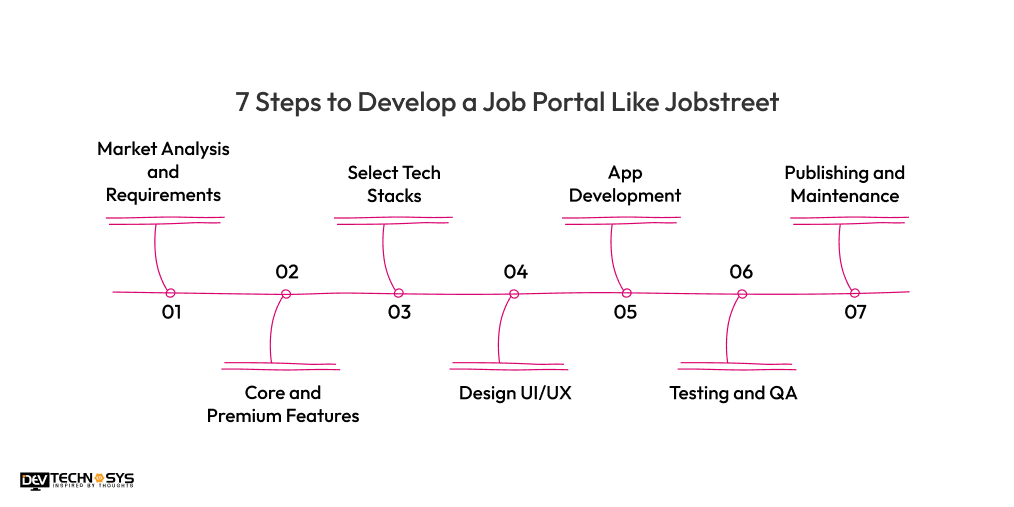
1. Market Analysis and Requirements
Start by researching current job market trends, identifying your target users—job seekers and employers—and analyzing key competitors like JobStreet. Define your business goals, platform objectives, and user needs.
Hire mobile app developers who help shape feature requirements and sets a strong foundation for building a competitive job listing site.
| What is the main objective of the project? |
| What are the competitors’ strengths and weaknesses? |
| What pricing strategies are common in this market? |
2. Core and Premium Features
Develop essential features like job listings, filters, resume uploads, and application tracking. Add premium features such as priority listings, employer branding, and resume writing services to generate revenue.
These functionalities provide value to both job seekers and employers, helping attract a wide user base and increase engagement.
| Which features are essential to the product’s basic functionality? |
| How do premium features enhance the overall user experience? |
| What are the scalability needs for core features? |
3. Select Tech Stacks
In the third stage of development, hire dedicated developers to select a robust tech stack tailored to your platform’s specific needs. Use frontend tools like React or Angular, backend frameworks like Node.js or Laravel, and databases like MySQL or MongoDB.
Prioritize scalability, speed, and security to ensure your portal handles growing traffic and data efficiently over time.
| Which type of tech stacks are used in your Jobstreet clone development? |
| Does the tech stack comply with industry standards or regulations? |
| Does the tech stack integrate easily with third-party services? |
4. Design UI/UX
Create a user-friendly and responsive interface that ensures smooth navigation for job seekers and employers. Design clear calls to action, easy job search options, and intuitive dashboards. Good UI/UX design builds user trust and satisfaction, making them more likely to return and recommend your platform.
| How will the design ensure accessibility (e.g., color contrast, text size)? |
| How will UI components adapt to different screen sizes? |
| How can we make the product feel intuitive for first-time users? |
5. App Development
Let’s move to the fifth mobile app development process, begin developing both web and mobile applications. Integrate functionalities like user registration, job alerts, messaging, and admin controls. Use APIs for third-party services such as email, SMS, and payments. Focus on clean, modular code for scalability, security, and performance from the very beginning.
| What platform(s) will the app be developed for (iOS, Android, both)? |
| What integrations are needed (e.g., payment systems, third-party APIs)? |
| How will the app handle offline functionality? |
6. Testing and QA
Perform rigorous quality assurance through unit tests, integration tests, and user acceptance testing. Identify bugs, performance issues, and UX flaws across devices and browsers. Thorough QA ensures a stable, secure, and user-friendly platform ready for real-world use without risking your brand’s credibility.
| What types of testing will be performed (e.g., unit, integration, end-to-end)? |
| How will performance and load testing be conducted? |
| How will security vulnerabilities be tested? |
7. Publishing and Maintenance
Hire a professional mobile app development company to deploy your career network on servers and app stores. Monitor its performance, fix issues quickly, and respond to user feedback. Regular updates, feature enhancements, and security patches keep your platform reliable, competitive, and aligned with evolving user expectations and market demands.
| Which platforms will the app be published on? |
| Is a post-launch support plan in place? |
| How will user feedback be collected and addressed? |
10 Basic and Advanced Features of a Job Portal Like Jobstreet
These features make the employment platform more usable and efficient, improving the job search experience for both job seekers and businesses. Here are 10 features of a job portal like JobStreet:
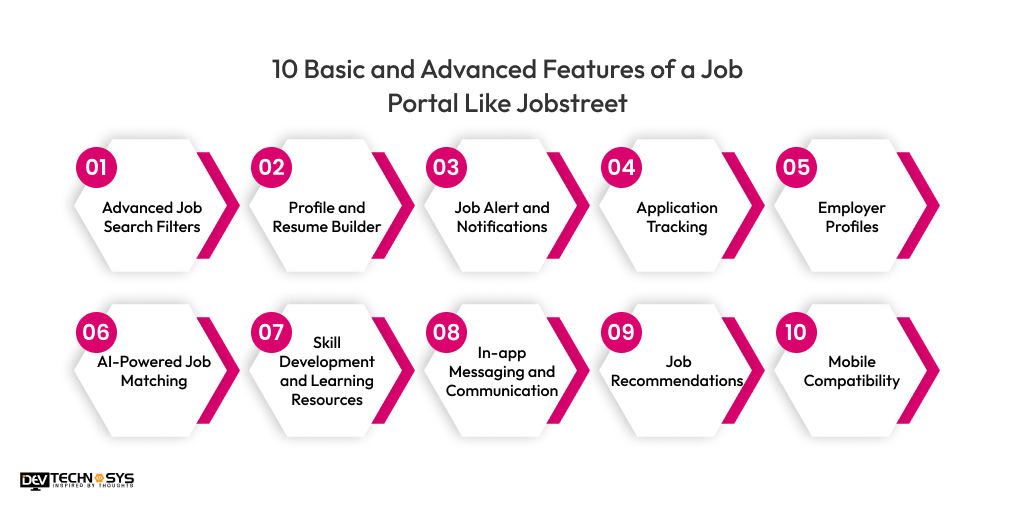
1. Advanced Job Search Filters
Jobstreet alternatives enable job seekers to search for job postings using various parameters, including job title, industry, location, income range, and experience level.
2. Profile and Resume Builder
Candidates may construct thorough profiles that highlight their qualifications, experience, and talents, as well as use a resume generator to produce professional CVs.
3. Job Alert and Notifications
A job portal app like Dice offers personalized job alerts, sending users relevant job listings based on their interests and search history.
4. Application Tracking
The Jobstreet mobile app allows job seekers to track the status of their job applications, keeping them informed about any changes or updates from businesses.
5. Employer Profiles
Companies may create profiles that highlight their culture, work environment, and employee perks, therefore recruiting top personnel.
6. AI-Powered Job Matching
AI algorithms review people’s profiles and interests, proposing employment that match their talents and expertise.
7. Skill Development and Learning Resources
Job search engine may provide candidates with online courses, certificates, and skill-building tools to assist them in increasing their employability.
8. In-app Messaging and Communication
LinkedIn alternatives enables candidates and employers to contact each other directly via the site, streamlining the recruiting process.
9. Job Recommendations
Users are given job suggestions based on their previous searches, which helps them uncover more relevant jobs.
10. Mobile Compatibility
Jobstreet alternatives allow users to apply for jobs, receive notifications, and maintain profiles directly from their cellphones.
The Cost to Develop a Job Portal Like Jobstreet
The cost to build a job portal like JobStreet normally varies from $8,000 to $25,000 or more, depending on platform complexity, features, design, and location. Key cost variables include job search capabilities, AI job matching, resume builders, payment gateways, mobile app development, and security.
Custom development and integration of new tools like as AI or chatbots might result in huge cost increases. Additional maintenance and upgrades also increase long-term expenditures.
| Job Portal Development | Estimated Cost | Time Frame |
| Basic Portal Development | $8000 – $12000 | 2 to 6 Months |
| Mid-Premium Portal Development | $14000 – $19000 | 6 to 8 Months |
| High-Premium Portal Development | $25000+ | 9+ Months |
5 Key Factors That Affect Job Portal Development Cost
Job portal development cost are influenced by factors such as back-end complexity, development team expertise, and application design. Additional features like AI job matching, mobile compatibility, and enhanced security increase costs. Post-launch assistance, maintenance, and ongoing updates also contribute significantly to the overall expense of development.
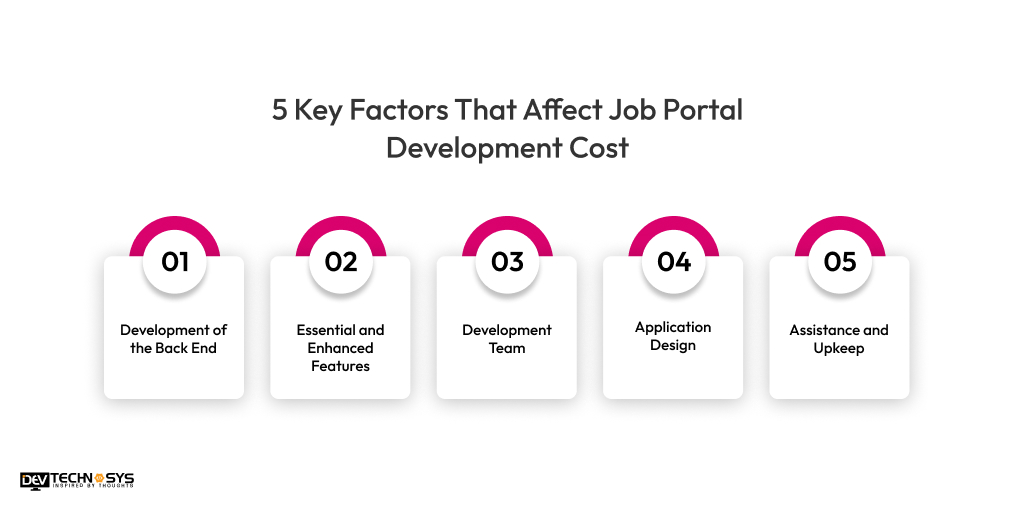
1. Development of the Back End
The back-end development, including server architecture, database management, and API integrations, plays a crucial role in a job search engine’s performance. Complex back-end structures with high scalability or advanced data processing can increase the cost to develop a portal like Jobstreet, as they require more resources and technical expertise to ensure smooth operation and data security.
| Backend Development | Cost Estimation |
| Simple Backend Process | $10,000 – $18,000 |
| Advanced Backend Process | $20,000 – $28,000 |
2. Essential and Enhanced Features
Standard features include job search, profile creation, and CV building. However, adding AI-based job matching, chatbots, or real-time messaging might boost development expenses. Enhanced functionality necessitates more extensive development, testing, and integration, which might increase the job search app development cost.
| Features | Cost Estimation |
| Core Features(Job Search Functionality and Job Alerts) | $8,000 – $10,000 |
| Advanced Features(AI-Powered Job Matching and Job Recommendations) | $13,000 – $19,000 |
3. Development Team
The experience and location of the development team significantly impact costs. High-end developers, particularly those from areas with higher labor costs, will charge extra for their skills. Furthermore, if specific capabilities such as AI, machine learning, or enhanced security are required, the cost of employing experts increases significantly, pushing up the overall Jobstreet job portal development cost.
| Developer’s Experience Level | Cost Estimation |
| Entry-Level Developer | $15 – $18/ Per Hour |
| Mid-Level Developer | $18 – $22/ Per Hour |
| Senior-Level Developer | $25+ / Per Hour |
4. Application Design
The employment portal’s design affects both UX and development costs. A basic design is less expensive, but bespoke, user-centric designs with complicated interfaces or mobile app compatibility might raise the cost. High-quality graphics, sensible layouts, and responsive designs demand more time and specialist designers, which raises the mobile app development cost.
| Design Quality | Cost Estimation |
| Basic Design | $8,000 – $12,000 |
| Complex Design | $15,000 – $22,000 |
5. Assistance and Upkeep
Post-launch assistance and ongoing maintenance (bug fixes, security updates, server support) are often overlooked but are essential for a talent marketplace’s long-term success. Ongoing costs for user support, scalability, and updates can add significant value but also increase the overall cost to build a portal like Jobstreet, especially if your portal grows in user base and complexity.
| Maintenance Phase | Cost Estimation |
| Simple Maintenance Phase | $2,000 – $4,000/year |
| Complex Maintenance Phase | $7,000 – $9,000/year |
How to Make Money From a Job Portal Like Jobstreet?
Earn money by charging companies subscription fees for job posts, providing premium services to job seekers, displaying targeted adverts, collaborating with affiliates for commissions, and monetizing resume database access to help employers and recruitment agencies locate talent quickly. These tactics might help you maintain and expand your platform.
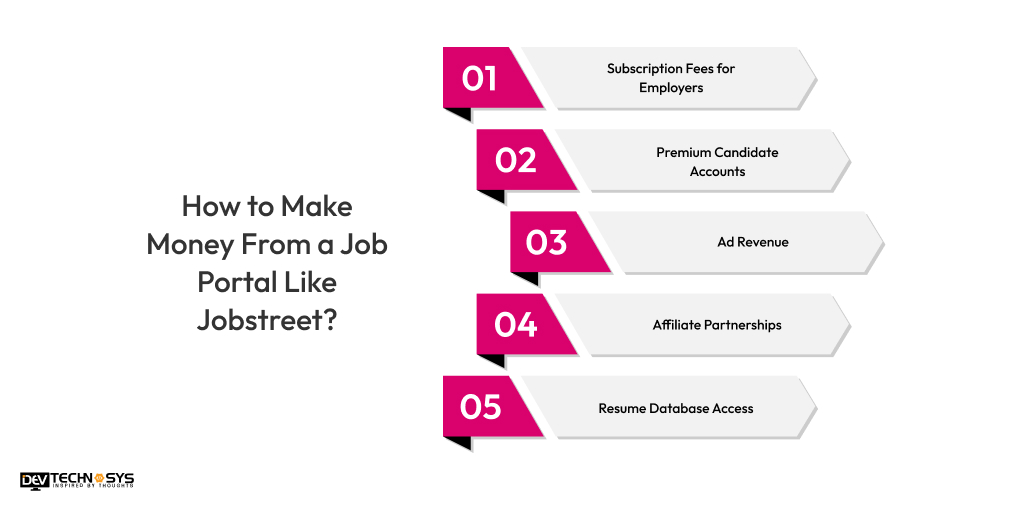
1. Subscription Fees for Employers
Employers are charged a monthly or annual subscription fee to post job openings, have access to premium features, and manage applicant applications. You may provide tiered pricing with various degrees of access to things such as resume databases and job analytics.
2. Premium Candidate Accounts
The skilled staffing solutions allow job searchers to upgrade to a premium account for more exposure, unique job ads, and highlighted resumes. Premium accounts allow prospects to stand out to recruiters and receive faster answers.
3. Ad Revenue
Jobstreet clone makes money by showing banner advertisements or sponsored listings from third-party marketers on your website. Targeting certain employment sectors or industries allows advertising to access a relevant audience of job searchers and employers.
4. Affiliate Partnerships
Collaborate with educational platforms, training providers, and recruiting agencies to market related products and services. According to the Android app development company, earning a commission on recommendations or sales made via your portal is an effective approach to increase revenue.
5. Resume Database Access
You can charge businesses or recruiting agencies for access to your resume database. They may search for possible applicants or download resumes using precise criteria, providing a quick and effective approach to locate talent.
Conclusion
In conclusion, developing a job portal like JobStreet requires careful planning, a user-friendly design, robust back-end development, and integration of key features like job search, resume building, and AI job matching. Focusing on both employer and candidate needs, along with implementing effective monetization strategies, will help create a successful and sustainable platform. Are you looking to make a job portal like Jobstreet? You can then directly consult with our job portal development company to receive cost-effective development solutions.
Frequently Asked Questions
Q1. How Much Does It Cost To Develop a Job Portal Like Jobstreet?
The cost to build a job portal like Jobstreet typically ranges from $8,000 to $25,000+, depending on features, design complexity, platform choice, and the development team’s expertise.
Q2. How Much Time Does It Take to Create a Job Portal Like JobStreet?
To make a job portal like Jobstreet, it generally takes 3 to 6 months, depending on criteria such as feature complexity, design, development team size, and testing needs. Customizations and integrations might have an impact on the timetable.
Q3. Can I Add AI Features to My Job Listing Site?
Yes, you can add AI features to your job vacancy portal. AI can enhance job matching, automate resume screening, provide personalized job recommendations, and predict hiring trends, improving the overall user experience and recruitment efficiency.
Q4. What Technologies Should I Use to Develop a Job Portal Like Jobstreet?
To create a portal like JobStreet, use technologies like PHP, Python, or Ruby on Rails for the backend, React or Angular for the frontend, MySQL or MongoDB for databases, and AWS for cloud hosting and scalability.
Q5. What Are The Essential Features for a Recruitment Portal?
Essential features for a job vacancy portal include job search functionality, employer and candidate profiles, job alerts, resume builders, application tracking, AI-powered job matching, messaging systems, payment gateways, and admin panel for management.
